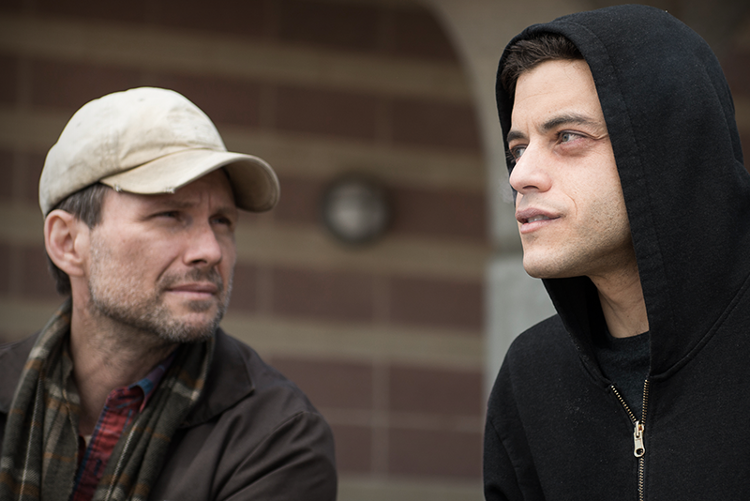America, we have found the cure to our summer television doldrums.
USA Network on Wednesday debuted its out-of-the-mainstream hacktivist thriller Mr. Robot, which dares to create its own genre of TV activism, whether intentionally or not, by eschewing conventional political norms and aggressively challenging the status quo.
Mr. Robot follows a skilled and troubled hacker named Elliot (Rami Malek), who is saturated with Robin Hood-esque ideology. Elliot saunters through city streets in a dark hoodie, only revealing himself when he’s personally confronting targets or poking through their digital lives in the comfort of his dreary apartment.
We quickly learn that Elliot repeatedly questions his own mental state and enjoys morphine in moderate dosages, so far as we know. But he is definitely not a fan of America’s corporate overlords. In fact, he’s convinced that the “top 1 percent of the top 1 percent” controls the world. These issues seem to inspire his illegal, yet exhilarating, intrusions into the lives of those he seeks to expose.
It’s hard not to compare Elliot to serial killer Dexter Morgan (Dexter), who followed his own moral “code” that allowed him to chop up people who themselves had committed evil acts. Instead of collecting blood samples as a trophy, Elliot keeps a binder filled with CD’s of those he deems morally reprehensible. While Dexter killed to satisfy a natural urge he couldn’t suppress, Elliot seems to act for the greater good, though he does get a measure of joy by upending people’s lives.
Mr. Robot pulls no punches, even taking jabs at the world’s most revered icons. Instead of genuflecting on the life of brilliant Apple co-founder Steve Jobs, Elliot can’t help but think of the deplorable conditions that Chinese workers manufacturing Apple products are forced to endure, while the company rakes in billions. The issues of economic inequality and exorbitant student loan debt are also central themes in the premiere episode.
And what does he think about the world’s leading social media organization? “I hate Facebook,” Elliot says. Point taken.
The pilot episode begins with Elliot uncharacteristically meeting face-to-face with one of his targets. The scene is tense, invoking visceral reactions from both characters as they stare each other down from across a small table.
While the interaction is meant to shed insight into Elliot’s brilliant hacks, it also provides a glimpse into the protagonist’s life: he lost his father to Leukemia; he admits to perhaps being a little crazy; he won’t be silenced by money.
Despite political views reminiscent of Occupy Wall Street, Elliot works for a computer security company that protects the very institutions he can’t stand, including E Corp., a mega-corporation which Elliot dubbed, “Evil Corp.” His best friend Angela (Carly Chaikin), an account executive at the firm, got him the job.
Elliot doesn’t enjoy going to work, but he does feel an allegiance to Angela. So when an unknown hacker conducts a sophisticated Denial of Service (DoS) attack into E Corp.’s systems, Elliott is forced to play hero, despite the company’s representing everything he hates about the power that money breeds.
This hack leads him to a shady character played by Christian Slater, who goes on to preach to him about an upcoming revolution, one that would bring about the largest redistribution of wealth in history. On the surface it would seem that such a cause would immediately appeal to Elliot’s own propensity for digital vigilantism, but he comes away conflicted.
After several unsuccessful attempts to discover a summer series worth devoting time to, we may finally have found a winner.
But the question is will Mr. Robot’s unapologetic take on America’s widening income gap amid Wall Street’s record profits be too much for some viewers to handle?
The USA Network doesn’t seem to think so. After one episode it has already been renewed for a second season.



































